Childlike vs Childish: Mary’s Meme-ification
By Elsa Kienberger
Melodramatic, selfish, pouty Mary Musgrove is the only Persuasion (2022) character who says anything meaningful about Regency womanhood that is congruous with gender expectations today.
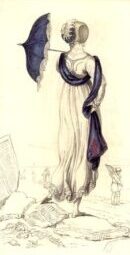
Her lines in Carrie Cracknell’s adaptation are like Reductress captions, with just a little less of the same satirical punch. Although she is portrayed as childlike, a desirable Regency trait for women since it meant they were innocent and subordinate, she instead uses this quality against prescribed gender roles. The choice to cast Mary McKenna-Bruce intentionally aligns the character with an actress who, until recently, was a child star in the popular British children’s show Tracy Beaker Returns (2010-2012) and its spinoff The Dumping Ground (2013-). Don’t be fooled into thinking Disney Channel would air these alongside Raven’s Home (2017-) and reruns of Hannah Montana (2006-2011) though.
These shows delve into the UK’s care home system through the eyes of residents like McKenna-Bruce’s Tee Taylor. As Mary, the actress steps into her first name-making adult role by remodeling childishness into a persuasion tactic. Although Regency women are not supposed to express their desires, Mary’s childlike manner disarms and frustrates the other characters enough for them to give in to her wants. In contrast to the youngest Musgrove, Dakota Johnson’s Anne Elliot is set up to be a discerning middle-child, yet many critics have pointed out that in Persuasion she is wise by principle of Austen-canon rather than in terms of what is caught on camera. Anne’s dignity is made shallow by slapstick humor, but Mary’s surface-level concerns dig deeper.
Entertainment journalist Elisa Guimaräes sums this up in her article (Collider, 2022) by depicting Mary’s behavior as a nuanced family trait:
2022 Anne is just as childish and vapid as the rest of her close family. Her constant sarcastic glances, blabbermouthing, and judgmental comments about everyone around her make her seem shallow and immature, like just any other Elliot. […] Her character is completely lacking in self-awareness, and this is precisely the territory in which McKenna-Bruce’s Mary finds her spot in the limelight.
Anne’s youthfulness and even ambivalence towards growing up finds analysis in Adela Ramos’s “Girl with a Rabbit”. In another vein, Gitanjali Poonia’s essay “You need to speak Gen Z to watch Netflix’s ‘Persuasion’” and Madeline Scully’s review provide comprehensive explorations into why viewers have a hard time buying into Anne’s updated lingo. But that’s Anne. Mary pulls it off.
Her blasé attitude and comically careless speech distance her from the emotional labor expected of a Regency woman, especially of one who is a wife and mother. Even Netflix, where this latest Persuasion adaptation was released for streaming, considers her the most quotable character. The streaming service went so far as to make a compilation video called “Mary has the best lines in PERSUASION” So, let’s do some scene—or meme—analysis then.
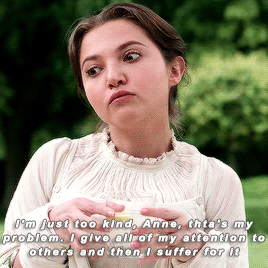
Take the meme above, sourced from a gif of the movie. The scene opens with Anne and Mary enjoying a tea on the lawn—or at least Mary is enjoying hearing herself talk while Anne responds in Italian. Before realizing what her sister is doing, Mary arrives at this meme’s aphorism of self-realization. It is ridiculous because viewers might call her statement categorically wrong: her attention is always focused on herself. In the larger social context of the Regency era, “being kind” and “giving away attention” would have been qualities encouraged in women. The fact that Mary likens it to suffering instead of fulfillment is a moment in which she subverts gender norms. That men receive excessive praise for the same selflessness expected of women adds to the satire as this double standard still exists today. Another often quoted Mary-line “The thing about me is, I am an empath”, spoken in wistful tones after protesting that taking care of her sick children would be too emotionally taxing, further exposes the irony of her statements.
McKenna-Bruce’s portrayal makes it difficult to remember that Mary is married with children because she seems so much like a child herself. In an interview with Grazia’s Rebekah Clark, McKenna-Bruce credits Shirley Temple as a childhood influence, and there is a certain Temple-esque wide-eyed stare she intersperses between Mary’s phrases to hilarious effect. Challenged to a dance-off though, Mary would probably tap over everyone’s toes. Whereas Sophie Thompson’s Mary in Roger Michel’s 1995 Persuasion makes withering remarks in a soft but even voice, Netflix’s updated Mary lilts her voice up at the end of sentences and says everything like it’s the first thing that’s come to mind and must be aired. Critics might perceive this as evidence of her childlike thoughtlessness, but by never censoring herself she escapes the strict social and gender norms Anne does not. When Anne fails to censor her thoughts at a dinner gathering, revealing that Charles Musgrove almost married her, she is still enforcing stereotypes about the marriage market and competition between women. Even though Anne’s admonishments to Mary are meant to check her narcissism, Anne is also simultaneously reinforcing Regency gender expectations and narratives of motherhood onto her little sister. For example, in order to distract Mary, Anne asks where her children are. When Mary neither knows nor cares, she plays into stereotype by both Regency and present-day standards of the “bad mother”. Speaking to Sam Cohen at 1883, McKenna-Bruce says: “When I first read her, I was like, “Oh my God, she’s Moira Rose in a Jane Austen novel”, referring to Catherine O’Hara’s outrageously dramatic portrayal of a mother in Schitt’s Creek (2015-2020).

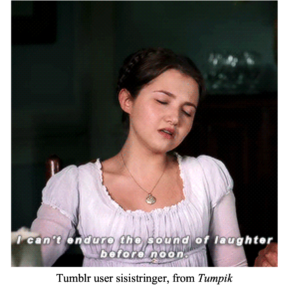
Despite her immediate reaction, she understood Mary not as a funny character, but as an appropriate reaction to the social conditions she is under: “It was more about finding the realness of Mary because she was living in this time where everyone was telling you what you have to do, who you have to marry, and where you have to be. And that is frustrating. So, I could definitely see how she ended up just hating everything”. Mary might be childlike and a bad mother, but she is not childish. She already has two children older than five years old in the movie, and estimating her age from Austen’s novel, she is twenty-two. She demonstrates how Regency girls must grow up quickly in a marriage economy that values worth in terms of their youth, beauty, and reproductive organs. If this sounds familiar, that’s because two-hundred years later this Western standard of worth still has its aftershocks. In the West, women are not expected to marry young, but social prescriptions of desirability affect people of every gender around the world.
Since Mary’s lines are generally funny both in and out of context, her memes reach people who have not seen the film even though they are created by and for the in-group of Persuasion moviegoers and Austen fans. Sometimes, however, context makes her lines and attitude less humorous on closer inspection. When put in relation to the colorblind casting of the film, her lines at times smack of structural racism. Let’s look at another memed-scene to see how:
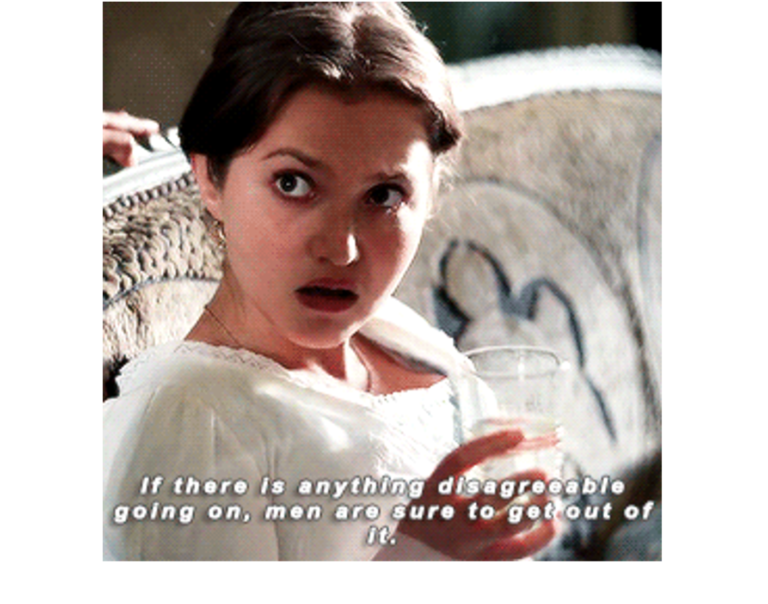
On its own, the humor of this meme relies on Mary’s expression paired with her direct and compact gender commentary. Additionally, for those who have seen the movie, the context adds to the laugh because we know the stakes of her protest are low. She might have to miss the first (but she knows not the last) dinner party with Captain Wentworth to watch her sick children, while her husband makes an appearance on behalf of the family. Mary points out the gender bias involved in the choice to detain the children’s mother but not their father, Mr. Charles Musgove. However, this is where historical and social context becomes more complicated. In this adaptation, Doc Brown aka Ben Bailey Smith plays Charles, which means that Mary’s husband and all of the Musgrove family, besides Mary, are Black. What does it mean if the only Black man in the film at this point is not at the table? On screen this is solved by Anne staying behind with the children, while both parents attend. However, Anne is only visiting, meaning that usually the Musgroves have to placate Mary as she continually victimizes herself. Sometimes, Mary is not a Shirley or a Moira but a Karen. The film makes clear that dealing with her is emotional labor that negatively impacts everyone; but it burdens her family especially. As a result, Henrietta and Louisa’s attempt to sneak off for time together without Mary’s energy-draining presence takes on additional meaning considering that in addition to Regency gender expectations, they also live in a society that privileged the feelings of white people—and continues to do so. Even when her “suffering” is the butt of the joke, the Musgroves still have to put up with it. They do not, however, have to take her seriously, and they never do.
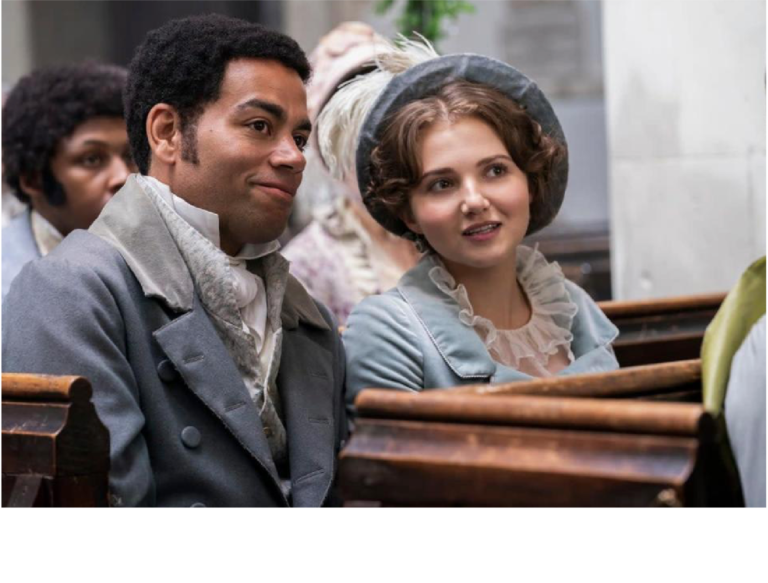
The film is aware (though perhaps imperfectly so) of gender discrimination in the Regency and its traces in the modern day. But is it aware of racial discrimination? Cracknell’s interview in the LA Times is telling:
[Austen’s] time wasn’t about racial issues. Because, of course, there weren’t other races that were involved in the world that she was dealing with, so the idea of colorblind casting [worked]. Henry Golding could play Mr. Elliot because it doesn’t really matter. And Nikki could play Lady Russell. There’s no reason not to.
Although Cracknell is defending the film against critics upset about its casting, by undermining the decision to have a diverse cast, she denies the contemporary and historical significances of race. Austen’s time certainly was about racial issues: Britain abolished the slave trade in 1807 and slavery in 1830, while Persuasion was published between these dates, in 1817. At a personal level, Austen interacted with imperialism from the products she consumed to her experience of her brother’s naval career, which influenced her portrayal of the navy in Persuasion. Her unfinished manuscript Sanditon (1925, but written 1817), includes a character described as a “half mulatto” West Indian heiress. Furthermore, Persuasion‘s diverse cast does matter, just as it does in enterprises like Bridgerton (2020-) and Mr. Malcolm’s List (2022). It matters a lot to viewers wanting to see actors who look like them and to viewers looking for media that goes beyond long-held Hollywood norms. Some viewers may not take the significance into account, but many will and do. This is why, when Mary makes egotistical quips that mildly challenge gender norms during arguments with her husband, it can have an exasperating effect. The film flirts with structural racism when it would benefit from considering the actors beyond the casting process and updating the script with them in mind. A Mary-meme cannot encapsulate all of this information and context. Due to its sparse text and image pairing, it is not structured to be educational but it can start a critical conversation.
Mia McKenna-Bruce’s Mary succeeds overall in the way she disguises the childlike as childish, thereby giving audiences opportunities for reflection on their social environments if they engage. Another exceedingly quotable Mary with the last name Wollstonecraft advocated for education as an antidote to ignorance 40 years before Austen wrote Persuasion: “My own sex, I hope, will excuse me, if I treat them like rational creatures, instead of […] viewing them as if they were in a state of perpetual childhood, unable to stand alone.” Critics of the new Persuasion film echo A Vindication of the Rights of Women (1792) with their frustration at the way Austen’s original story lost some of its reason and complexity in this adaptation. Our dissatisfaction with the movie gives us much to reflect on, and as Katherine Voyles’s essay outlines, this place of questioning is also one of learning. Isolating stills from their context can hide larger narratives in Mary-memes, yet memes can open up new avenues for thought even without context. For example, this @savedbythebellhooks post does just that:
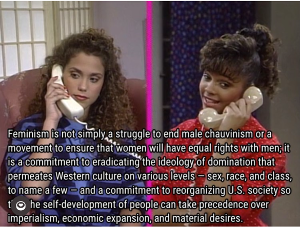
For those new to this account, it places Saved By the Bell (1989-1993) stills alongside bell hooks quotes, in this instance taken from Ain’t I a Woman: Black Women and Feminism (1981). Although hooks focuses on US society in the twentieth century, the Regency UK filtered through Cracknell’s twentieth-century film bears the imprint of a similar ideology. Mary’s persuasive genius is that she makes audiences laugh while drawing attention to power imbalances. If she makes us laugh, we need to ask: are we laughing at her or with her. Then we need to ask why, not childishly, but with open-eyed curiosity.



Social Media